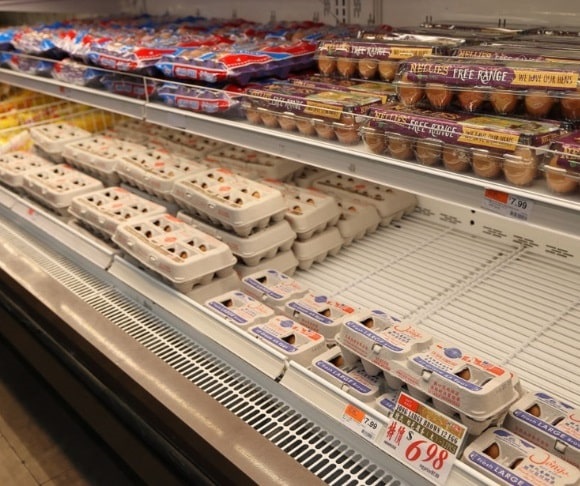Egg prices have climbed so much over the past year that it has become a financially eggs-hausting experience for shoppers at the supermarket. In November, the cost of a dozen eggs surged by 49.1% year-over-year, averaging $3.59. Investors looking to shield themselves from inflationary pressures might have learned that it was not gold, Bitcoin, or Swiss francs that were inflation hedges. Eggs might have been the answer to a soaring consumer price index (CPI) all along!
Why Are Egg Prices So High?
 Food inflation has been a severe problem for the United States since the early days of the coronavirus pandemic. But the growth rate started accelerating in the spring of 2021, with nearly every item increasing significantly. But, of course, the price jump for the typical carton of eggs has been noticeable in recent weeks, as many consumers have taken to social media to share images of outlandish prices. For example, in California, the average cost for a dozen eggs topped $7 to kick off 2023. Or, in the Midwest, prices have surpassed the $5 mark.
Food inflation has been a severe problem for the United States since the early days of the coronavirus pandemic. But the growth rate started accelerating in the spring of 2021, with nearly every item increasing significantly. But, of course, the price jump for the typical carton of eggs has been noticeable in recent weeks, as many consumers have taken to social media to share images of outlandish prices. For example, in California, the average cost for a dozen eggs topped $7 to kick off 2023. Or, in the Midwest, prices have surpassed the $5 mark.
The latest trends are forcing customers to make some changes to their grocery lists. Instead of free-range, organic, or pasture-raised eggs, they buy conventional ones. Rather than a dozen eggs, they are opting for half-dozen packages. Some clever consumers tried to save some money by buying processed eggs (liquid or powdered form), but their prices have soared just as much.
This must mean that chicken prices have soared at the same rate. However, while the cost of chicken at the supermarket has climbed at a double-digit pace, it is up only 13.7% year-over-year (yes, this is still extremely high!) and tumbled 0.8% from October to November. So, what is going on exactly?
It is an issue of supply and demand. Egg consumption has increased exponentially, but output has failed to keep up with the volumes because of the ongoing crisis involving the contagious and lethal highly pathogenic avian influenza (HPAI). According to the US Department of Agriculture (USDA), approximately 58 million birds have been infected with the avian flu, including roughly 43 million egg-laying hens. When birds are infected, they must be slaughtered, reducing supplies in the marketplace. Chickens raised for meat production have been largely unscathed, but the hens have been decimated.
Overall, this is the deadliest outbreak in the nation’s history.

(Photo by I RYU/VCG via Getty Images)
The other factor has been skyrocketing diesel and animal feed costs. The national average price for a gallon of diesel is $4.64, but it is above $5 in certain states, such as California, New York, and Pennsylvania. Meanwhile, feed prices have spiked more than 8%. Both are critical components for farmers across the country.
Unfortunately, market experts say that it will take another three to six months for egg prices to moderate. In the meantime, the marketplace is responding to the fiasco by limiting the number of eggs customers can purchase. But this is akin to the old joke of the patient who tells his therapist that his brother thinks he is a chicken, and the analyst asks, “Why don’t you get rid of him?” And the man responds, “Because I need the eggs.”
Lettuce Have a Break?
Unfortunately, eggs are not the only food product wreaking havoc on household budgets. Everything is up across the board: margarine (+47.4%), flour (+24.9%), lettuce (+19.8%), potatoes (+16.2%), and coffee (+14.6%). The good news for carnivores is that other meat prices have either come down or slowed at an exceptional pace, including beef and veal (-5.2%), pork (+1.2%), bacon (-1.1%), and fish (+6.5%). This has been caused by two factors: consumers shifting their purchasing behaviors and strong production. However, industry experts warn that the good times are unlikely to last because farmers have been slaughtering their cattle prematurely due to a lack of feed and water, which means fewer calves this year and less beef in 2024 and 2025.
Is there relief on the way? When Cardi B starts tweeting about food prices and economics, there is something broken in the market.




